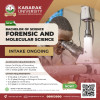- Under the School of Science, Engineering and Technology, this programme equips students with cutting-edge skills in forensic analysis.
Kabarak University has rolled out the Bachelor of Science in Forensic and Molecular Science.
Under the School of Science, Engineering and Technology, this programme equips students with cutting-edge skills in forensic analysis.
This includes crime scene investigation and DNA profiling—molecular biology such as genetic diagnostics and cellular research, and investigative science covering toxicology and criminal justice applications.
The programme blends biology, chemistry, and law enforcement training with a strong foundation in Christian ethics and civic responsibility, making it among the most holistic forensic science degrees in the region.
What sets Kabarak apart is its commitment to embedding Christian values and civic awareness into the curriculum, thereby producing scientists who are not only technically skilled but also morally grounded and socially conscious. This is a differentiator for youth seeking careers that align with both professional excellence and personal purpose.
Read More
To be eligible for this course, applicants must have a Kenya Certificate of Secondary Education (KCSE) mean grade of C+ or equivalent, with a C+ in Biology or Biological Sciences, C+ in English or Kiswahili, and a C plain in Chemistry and Mathematics or Physics/Physical Sciences. Diploma holders in relevant biological or forensic science fields from recognized institutions are also encouraged to apply.
Students enrolled in this programme benefit from hands-on training in modern labs equipped for DNA analysis, toxicology, and crime scene simulation. The curriculum is designed by experts in forensic science, genetics, and molecular biology, ensuring that graduates are prepared for careers in forensic labs, law enforcement, medical research, and biotechnology.
The programme also fosters ethical and professional excellence, with a values-based education that emphasizes integrity in scientific practice. The course runs for eight semesters.
Combining forensic science and molecular biology in a university setting is technically, logistically, and pedagogically complex. Forensic science demands mastery of crime scene protocols, legal procedures, and evidence handling, while molecular biology requires deep lab work in genetics, biochemistry, and cellular analysis.
Bringing both together means students must navigate two highly specialized toolkits, often with different lab setups, safety protocols, and analytical frameworks.
Kabarak University bridges this gap by designing a purpose-built curriculum, investing in modern infrastructure, and embedding Christian ethics and civic responsibility to guide students through complex moral terrain. Graduates are well-positioned for careers in biotech, law enforcement, public health, and justice reform.
Upon graduation, students can pursue science and lab-based roles such as Forensic DNA Analyst, Molecular Biologist, Forensic Toxicologist, Biomedical Scientist, and Forensic Serologist.
They may also explore law enforcement and justice careers including Crime Scene Investigator (CSI), Forensic Consultant, Police Intelligence Analyst, and Courtroom Expert Witness.
In the public sector, opportunities include roles like Public Health Analyst, Environmental Forensics Expert, and Policy Advisor in Science and Justice. For those drawn to education and advocacy, careers as University Lecturer, Science Communicator, Writer, or NGO and Civic Campaign Strategist are also viable paths.
The September intake is ongoing. For students ready to pursue truth through science, this programme offers not just a degree but a transformative journey.
If you're driven by evidence, ethics, and impact, Call +254 729 223 370 or +254 20 211 4658 or Email [email protected] or [email protected] or visit www.kabarak.ac.ke to apply and begin your journey into forensic discovery.












